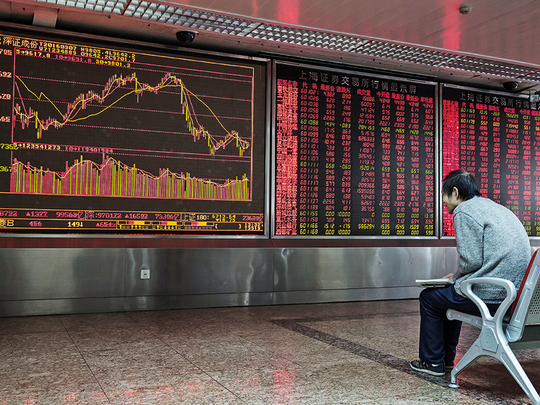
Dubai: Unlike last year, investors in the Gulf are committing their funds to China.
In 2016, Chinese stocks led the global markets into a tailspin on debt, regulatory and growth concerns, that wiped off a couple of trillion dollars from the market, but those markets have recovered since then, gaining trust from investors.
“There is a visible appreciation in interest toward China. Whereas last year people thought China was a weight on the world,” Mark Matthews, head of research Asia, at Julius Baer told Gulf News during a field trip to Dubai.
Investors see appreciation in the yuan and their corporate debt declining to GDP, which has given them confidence to invest back in the country.
“People were despondent on China they were just downbeat on the economy. They have been proven wrong. The numbers have been good so far. The property prices are very robust. There must be confidence in the regulators there because they are loosening capital controls and they have been raising interest rates,” Matthews said.
Reduced exposure
Julius Baer recently reduced sold off European stocks ahead of the first round of French elections.
The bank cut their equity holdings to 46 per cent from the earlier 48 per cent in April. The bank will make use of any weakness to get back in those markets.
“We used to be 48 per cent in equities, but we did reduce 2 per cent in equities before the first round of French elections,” Matthews said.
“We took some profits in Europe in April because we thought that market would decline in the first round of French elections. If there was a large correction in Europe, we would had taken advantage of that weakness, but that hasn’t happened,” he added.
The bank still holds 38 per cent in bonds, 11 per cent in money market, 5 per cent in alternatives.
Positive
Matthews expects positive returns from equities for the rest of the year, after stocks gained 5.5 per cent in the first quarter.
Statistically, since the past 22 years, markets have been up 5 per cent or more. Only 3 of those 22 were down for the rest of the year.
“Statistically if you are strong in the first quarter, then we are good for the rest of the year,” he added.
The best time to invest is the beginning of the year, up until May and from October till the end of the year. Historically, the period between May and October has been a time of zero returns.
But in all, investor confidence has returned despite the trade wars or geopolitical tension between the United States and North Korea.
“Investors have breathed a major sigh of relief following the first round of the French elections. They still worry about geopolitics and trade wars but neither is preventing them from remaining invested,” he added.
“The backdrop is still one that markets can continue to rise. There are a lot of the structural issues that can surprise on the upside like the tax cut in the United States. Things could surprise in Europe too with French elections and German elections later in the year,” Matthews added.
Broken co-relation
Matthews also spoke on the broken co-relation between equities and bonds.
“If you look at the relationship between interest rates and stock prices, there is a magic number where the co-relation breaks down,” Matthews said.
The stock markets and treasury yields which have been moving in one direction, may reverse that pattern if treasury yields pass the psychological 5 per cent mark.
“Even if treasury yields are 2.5 per cent, stock market returns are generally positive. The magic number is 5 per cent. When you get 5 per cent on treasury, if the treasury yields are rising, the return starts getting negative because 5 per cent is a good return on a least risky instrument,” he added.







